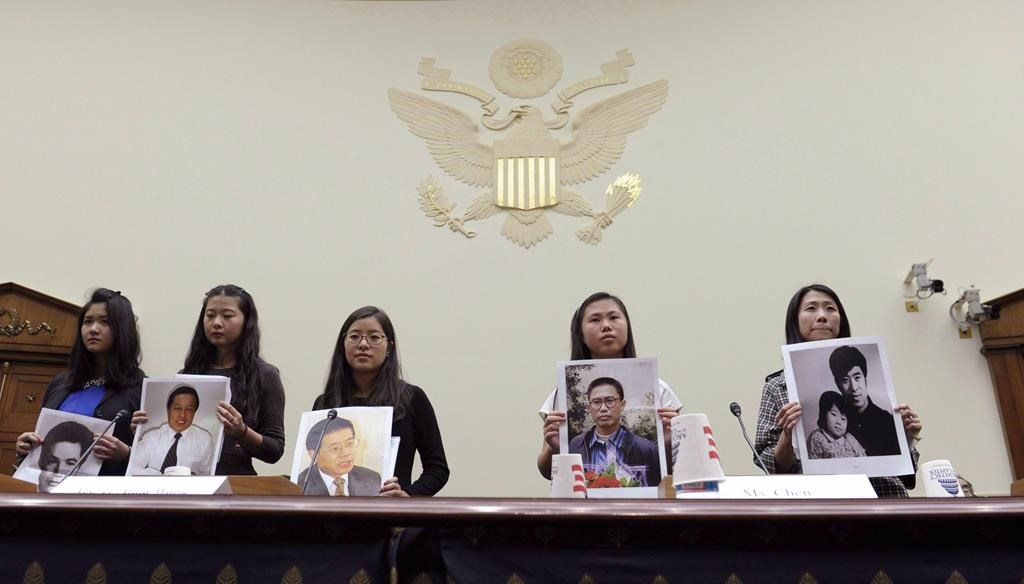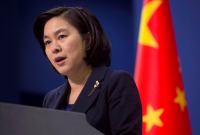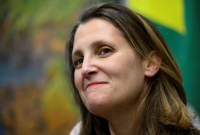Support strong Canadian climate journalism for 2025
Ti-Anna Wang was one passport stamp away from seeing her imprisoned father in a Chinese prison before her dream was shattered yet again.
On Wednesday, the Montreal woman arrived in southern China where her father, Wang Bingzhang — considered the father of China's ill-fated international pro-democracy movement — has been jailed since Chinese agents snatched him in Vietnam in 2002 and hauled him back to the People's Republic.
Her 11-month-old daughter was strapped into her papoose-style body carrier and her husband was by her side. Wang's passport contained a fresh Chinese visa, something she had been denied for 10 years. But it wasn't enough.
Her infant daughter and husband were deemed free to enter China. But she was not. So began a six-hour ordeal that would see Wang and her family locked in an airport detention room before they could be sent to a nearby South Korean island on the next available flight.
"I can't really articulate the disappointment because it's just so crushing," Wang said Thursday by telephone from the South Korean island of Jeju.
Wang said she knew the risks associated with travelling to China following last month's imprisonment of fellow Canadians Michael Kovrig and Michael Spavor, which appeared to be retaliation for Canada's arrest of high-profile Chinese executive Meng Wanzhou. But she was determined to make the journey because she might never get a chance to see her father again, and she thought the sight of his new granddaughter might boost his waning spirits.
Wang has for years pushed the Canadian government to work towards releasing her father. There is one hitch: while she is a Canadian citizen, he is not, despite a strong historic connection to Canada.
Wang Bingzhang was one of the first generation of Chinese students to come to Canada and he got his doctorate from McGill University. While in Montreal, he planted Canadian roots, which included having children who would become citizens. His exposure to democracy sparked hope of importing it to his birth country.
Ti-Anna was born in 1989, the year the Chinese military killed student protesters in the Tiananmen Square massacre, and he named her in honour of the fallen.
His abduction and widely derided trial in China in 2002 earned him a spot on a dubious list of 16 political prisoners that Amnesty International urged Prime Minister Justin Trudeau to advocate for during his most recent trip to China in late 2017. The list included Huseyin Celil, an advocate of China's persecuted Uighur community from southern Ontario, who received a life sentence in 2007.
When Wang's father was arrested, she was a teenager. Now 30, she has become a vocal human-rights activist, and has been harassed by Chinese officials during a United Nations presentation. She married, and this past February had her first child, a girl.
Wang said she gave up pushing the Canadian government to do more for her father, so she asked Global Affairs Canada to focus on something specific — pushing China to grant her a visa, which her activism had barred her from getting since 2009.
In August, she received word that the visa would be granted. She doesn't know how or why, but she was grateful for the government's efforts. With a new daughter, and a husband studying at university, they made a plan in November to travel in January.
Then the Dec. 1 arrest of Meng occurred and the arrests of Spavor and Kovrig followed.
"They (Global Affairs) said that they would not tell us not to go but they would just say that they think that I'm someone who could be vulnerable in this situation," she said.
So she and her husband decided to keep the trip to China short — just 48 hours — and Global Affairs said it would have a diplomat accompany them while in China. Wang and her husband travelled to South Korea in early January to stay with his relatives before making the hop to China.
They telephoned China's prisons bureau to say they were coming. They landed in Hangzhou, intending to travel to Guangzhou, where her father has been imprisoned. Then they hit a wall.
"I got the sense they were waiting for me because the border agent was communicating with another agent and said something like 'That's her.' "
She and her daughter were shuffled off to a small room by police, where they spent the next hour with officers always with them, before her husband was reunited with them.
They spent six hours there before her husband was able to buy them tickets on a late-night flight to Jeju.
Before leaving, her baby grew restless, crying and wailing and wanting out of mom's carrier. The police told her not to let her crawl on the grimy floor, but Wang had to let her blow off steam. Her daughter's mood improved and she started charming the police.
"I feel really bad having subjected her to that. At the same time, I think she kept the mood very light. My daughter's quite social and smiley."
Those smiles, however, were meant for Wang's father, who has spent most of his time in solitary confinement, with failing health, including strokes, asthma and inflammation in his legs.
Wang said it's distressing to think about what Kovrig and Spavor are enduring, but she has mixed feelings.
"Cases like that make me feel a little bit sad because I know that it means that my father's case cannot be a priority," she said. "When the Canadian government is negotiating on these issues with the Chinese, they cannot ask for too much each time."




Comments